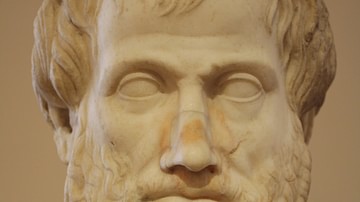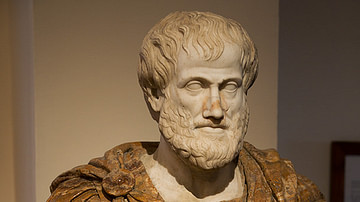Search
Remove Ads
Advertisement
Summary 
Loading AI-generated summary based on World History Encyclopedia articles ...
Search Results

Definition
Aristotle
Aristotle of Stagira (l. 384-322 BCE) was a Greek philosopher who pioneered systematic, scientific examination in literally every area of human knowledge and was known, in his time, as "the man who knew everything" and later simply as "The...

Article
Aristotle's On the Heavens
One of Aristotle's more famous quotes was, "All men naturally desire knowledge" ("πάντες ἄνθρωποι τοὺ εἰδέναι ὀρὲγονται φύσει") (Aristotle, Metaphysics, 1.980a.22). As a classical Greek philosopher, an ideology like this is required for producing...

Image
Aristotle Bust by Lisippo
A Hellenistic bust of Greek philosopher Aristotle by Lisippo from a bronze original. (Palazzo Altemps, Rome).

Image
Aristotle Tutoring Alexander
Artist's impression of an ancient Greek scholar tutoring a young boy. It was common for wealthy Greek families to hire private tutors for their children, as there were no public schools. Famously, Alexander the Great was tutored by Aristotle...

Image
Aristotle Bust, Palazzo Altemps
2nd century AD marble bust of Aristotle (Museo Nazionale Romano,Palazzo Altemps,Rome).

Video
Aristotle's Tomb Found in Greece
http://GreekReporter.com - Watch video from what archaeologists claim is Aristotle's tomb. Full story, photos and details http://greece.greekreporter.com/2016/05/26/aristotles-2400-year-old-tomb-found-at-stagira-photographs/ For more exclusive...

Image
Lyceum of Aristotle
The Lyceum of Aristotle, one of the centres of ancient Greek Philosophy.
Founded: 334 BCE
Location: Athens, Greece

Image
The Aristotle University of Thessaloniki, Greece.
The western side of the campus of the Aristotle University of Thessaloniki.

Video
Top 5 Facts - Aristotle
A pioneering philosopher and one of the most pivotal in a line of great men who informed our understanding of the world; here are 5 facts about Aristotle. For more historical facts and features, visit http://www.historyanswers.co.uk/...

Definition
Greek Philosophy
Ancient Greek philosophy is a system of thought, first developed in the 6th century BCE, which was informed by a focus on the First Cause of observable phenomena. Prior to the development of this system by Thales of Miletus (l. c. 585 BCE...